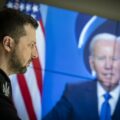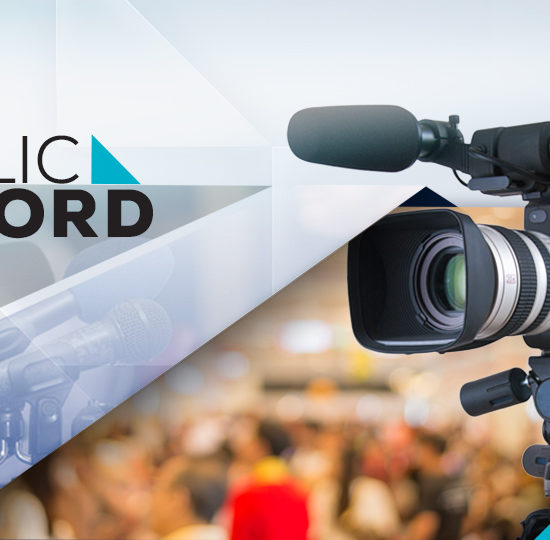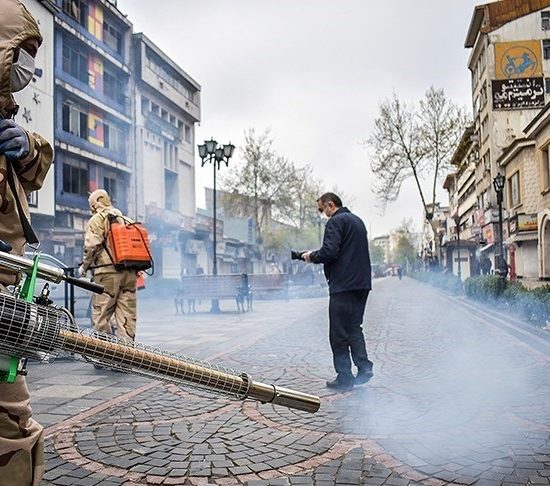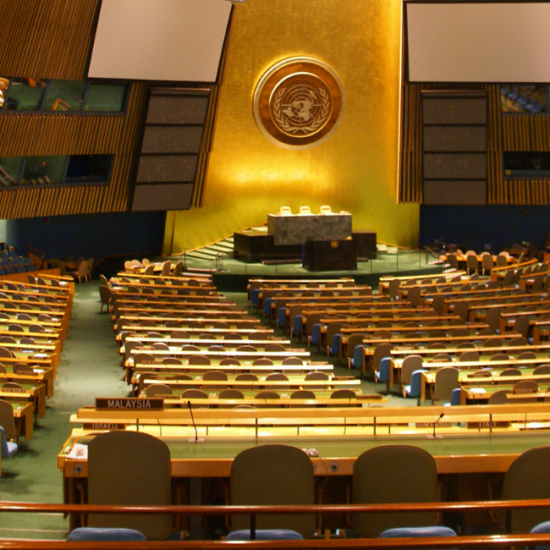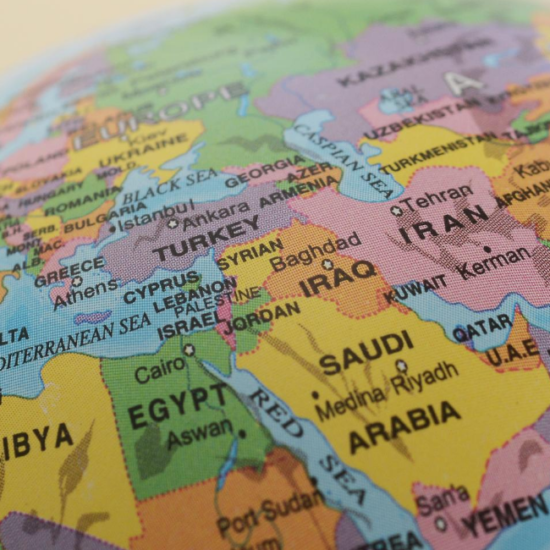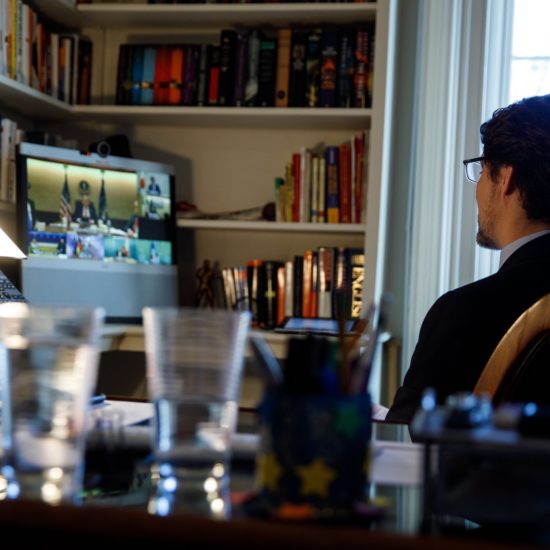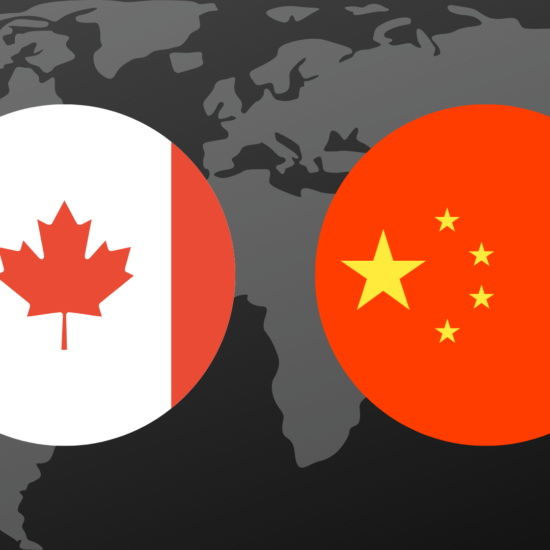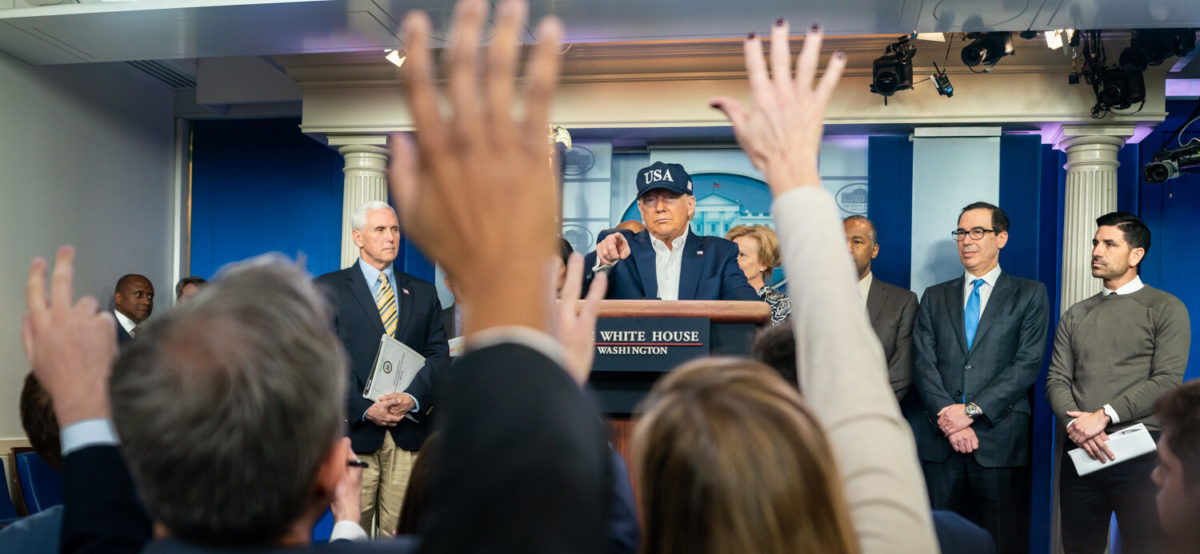
President Donald J. Trump, joined by Vice President Mike Pence and members of the White House Coronavirus Task Force, takes questions from the press at a coronavirus update briefing Saturday, March 14, 2020, in the James S. Brady Press Briefing Room of the White House. (Official White House Photo by Shealah Craighead)
The COVID-19 crisis has been a ‘turning point’ for China, giving it an opportunity–precisely as America’s leadership is faltering–to shift global power from West to East. The blame game that has emerged between the US and China shows just how strongly both powers value their reputation and the denigration of their rival amidst this crisis.
This article was originally published on Canadian Dimension.
By Amadeus Narbutt
As failures to contain the COVID-19 virus have made clear, pathogens do not care for borders, blockades, or embargoes. This is truly a global crisis, and global politics is rupturing from the volatility it has caused.
In a recent interview, Naomi Klein implored the public to brace for ‘coronavirus capitalism’, drawing reference to her now famous concept of ‘disaster capitalism’, where shock and awe crises give cover for seizures of power.
The extent and seriousness of this shock is hard to overstate, and it has only just begun. The transformations and weaponizations of its aftershocks are already evident in the ways many global actors have responded to the pandemic, including anti-democratic seizures of power, corrupt corporate bailouts, the straining of long-held alliances, and a vast soft power campaign by a recovering China.
What occurs in the next few weeks–and over the next 18 months it could take to develop a vaccine–will have seismic long-term effects on geopolitics and global capitalism.
In the midst of the initial panic, some governments have used the threat of contagion to threaten civil liberties and consolidate anti-democratic authority. Israeli Prime Minister Benjamin Netanyahu, for example, has bypassed the Knesset to institute draconian surveillance and geolocation measures under the guise of preventing the spread of COVID-19. Amid corruption charges and the formation of a new government, Netanyahu has closed the courts and the national legislature, leading some to call Israel the first ‘coronavirus dictatorship’.
In Hungary, Viktor Orban is already using his unprecedented emergency powers to promote reactionary social policy. Meanwhile, China restricted the press and detained individuals who reported on the pandemic online.
Beyond these immediate shocks, however, the economic impact of the pandemic creates further opportunities for disaster capitalism and global powers to exploit.
Quarantines, orders to close non-essential businesses, and spatial distancing measures have had pronounced economic costs, leading to spikes in unemployment claims not seen since the Great Recession of 2008-9. US stock exchanges experienced extreme volatility since early March, necessitating the use of market-wide ‘circuit breakers’ several times as the pandemic spread to the American continent. Further, Deutsche Bank recently forecasted a global recession in 2020 on a scale not seen since at least the Second World War, predicting a decline in China’s GDP by 31.7 percent in Q1 with an American contraction of 12.9 percent following shortly after in Q2.
These ruptures have not only led to insider trading among several US Senators, but are also resulting in a contentious bill in the Congress which will grant the Treasury Secretary control over a $500 billion corporate slush fund to bail out big business. The concessions that Democrats managed to extract to aid working Americans were meagre, and the stimulus itself–while historically massive–will not be enough to prevent a catastrophic recession. As it becomes clear that more needs to be done, expect the playbook to mimic the 2008 bailout and fall hardest on the backs of working Americans.
Dr. Anthony Fauci, who is heading the US response to COVID-19, stated that President Trump’s blockade on travel from China in the early weeks of the pandemic may have bought the US some time. However, Trump did not utilize that time effectively. The American medical system remains woefully underprepared and the US is currently on track to become the new global epicenter of the crisis. As the twin health and economic crises worsen, President Trump–who seems to have been hinging his re-election on what was an ostensibly strong US economy–will likely grow more reactionary and reckless.
The prioritization of profits over human lives will become more blatant than it has already. Racist and xenophobic rhetoric will continue to proliferate as scapegoats are desperately sought out to explain away the administration’s failure in handling the pandemic. As always, American aggression and economic warfare abroad will continue, particularly in places like Venezuela, Cuba, and Iran, where American sanctions are worsening the pandemic.
This same nationalism and aggression will be seen elsewhere, even amongst allies. Economist Yanis Varoufakis warns that the European Union’s response to the coming economic recession is already proving to be insufficient, and that its weak hand will further bolster nationalist sentiments within the EU. The very real impact of EU-imposed austerity on healthcare systems and the meagre assistance that the EU has offered to its own member states will give credence to the arguments of the next wave of Le Pens and Salvinis.
Already, fractures have emerged: a recent shipment of 680,000 medical masks destined for Italy, the epicenter of COVID-19 in Europe, was seized by Czech authorities, denying life-saving medical equipment to Italian medical professionals who have resorted to wartime triage measures in the absence of sufficient supplies. Italian Prime Minister Giuseppe Conte has already warned that the EU’s actions during this crisis, if they continue in this way, may threaten its legitimacy.
Amidst all this volatility, China has emerged from its lockdown with a new PR campaign of soft power. It was the Chinese government, after all, that sent the aforementioned shipment of medical masks to Italy, forging what President Xi Jinping has dubbed a ‘Health Silk Road’. As the location of the initial outbreak, China had a head start in battling the pandemic. Their aggressive lockdown measures stifled its spread and put China in a position where it has improved capacity to act on a global scale than most other countries. As a result, China has also delivered, or will be providing further medical supplies, to other EU member states, Canada, and several African nations.
Mirroring their global infrastructure and trade strategy known as the Belt and Road Initiative, China is investing diplomatic capital through bold proactive measures designed to assert their dominance on the world stage. Whereas before China was investing in physical infrastructure such as ports, railroads, and highways, it is now also investing through medical aid and public health leadership.
The COVID-19 crisis has been a ‘turning point’ for China, giving it an opportunity–precisely as America’s leadership is faltering–to shift global power from West to East. The blame game that has emerged between the US and China shows just how strongly both powers value their reputation and the denigration of their rival amidst this crisis.
The shifts occurring as a result of the COVID-19 pandemic are historic and volatile. While the eventual depth and duration of the twin health and economic crises are still unknown, there is no doubt that global powers are again using the shock of a crisis to consolidate power and vie for global leadership.
While some of the necessary domestic responses are becoming clear, the particular reorganization of global power that could prevent further exploitation of shocks and disasters is still elusive.

